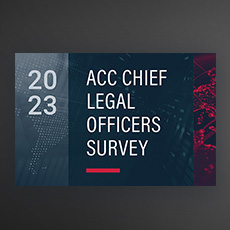
Every year, Exterro partners with the Association of Corporate Counsel (ACC) to conduct an in-depth survey of chief legal officers and general counsel at large US-based and international businesses to better understand their roles, concerns, challenges, and strategic priorities. This year, the 2023 ACC CLO Survey gathered responses to dozens of questions from almost 900 respondents representing companies ranging from under $100 million to over $3 billion in annual revenue across 20 industries and 35 countries.
It’s routinely the largest survey of top legal officers in the world, and this year was no exception. It’s truly an impressive report… but at 60 pages and with about 100 charts (I confess, I lost count!), it’s not a quick read. It takes a lot of effort to get to all the great nuggets of information that can make a difference to you, your team, and your e-discovery efforts.
But what if there were an easier way? Well there is, because last week we hosted three e-discovery experts to share their opinions on the report’s findings. Jessica Averitt, Esq., Partner at Backer McKenzie; Linda Luperchio, CEDS, Director if Information Governance and E-Discovery at Hanover Insurance, and David Yerich, Esq., Director of E-Discovery at UnitedHealth Group shared their thoughts and insights in a webinar titled Survey Says… Top 3 E-Discovery Takeaways from Recent Survey of 800+ CLOs.
So, what are the key takeaways?

Cybersecurity, regulatory compliance, and data privacy are the most critical issues to the business.
When asked to rate 16 issues including taxes, litigation, and supply chain management (among others) on a scale of 1 (least important) to 10 (most important), the three most important to the business were cybersecurity (8.2), regulatory compliance (8.1), and data privacy (7.9). These numbers represent a continuing trend that’s borne out not just by the data in the survey, but also by the increased enforcement of privacy laws from regulators like the FTC and the California Attorney General over the past year.
Chief legal officers are realizing that it’s not siloed anymore, that we have to work together and information security has to work with, with e-discovery. We’re all in this together.
Linda Luperchio, CEDS, Director if Information Governance and E-Discovery at Hanover Insurance
These changes might seem like they’re coming at the expense of e-discovery, but in reality, the multiple disciplines are converging. As Linda Luperchio observes, “The big takeaway is that the world’s changing, right? It used to be litigation was here, and e-discovery was with litigation. Then there was information governance, information security and data privacy [somewhere else]. They’re all starting to combine, and we are realizing that we all need each other… Chief legal officers are realizing that it’s not siloed anymore, that we have to work together and information security has to work with, with e-discovery. We’re all in this together.”
Additionally, there’s a benefit to e-discovery professionals as organizations adopt compliant data retention policies and start deleting older data—namely mitigating the risks posed by old, obsolete ESI that might turn up in discovery. As Yerich points out, “Selfishly, from an e-discovery only perspective, a lot of these concerns have really helped our cause because in the old days, we were the only ones who cared about old information that we really wished had been deleted, but nobody managed to get around to.”
CLOs value communication and leadership as top skills.
When asked which skills they are looking to develop for the lawyers in their departments, CLOs ranked communication and listening and leadership (both 64 percent) as the top skills, followed by business management and executive presence (both 59 percent). There was a nine percent increase in the number of CLOs that value executive presence and project management skills, an eight percent increase in CLOs that selected data analytics and visualization, and a seven percent increase in those that selected financial acumen. Clearly CLOs are recognizing the need for diverse skill sets on their teams, as legal professionals need to interact with their colleagues across the business, not just within the legal department.
If you really want to know if you’re doing a good job, it’s the cost per relevant document reviewed. Take all your documents reviewed, and then divide that by your total cost. You’ll come up with a number. If that number’s going down, you’re doing a good job. If that number’s going up, maybe you need to analyze why that happened in that case.
David Yerich, Esq., Director of E-Discovery at UnitedHealth Group
This need for communication is particularly important to the multiple departments handling data for the organization, including privacy, legal, and their counterparts in IT, according to Jessica Averitt. “The most important thing to help you manage your data effectively is communication. You’ve got to be talking to each other about questions like, ‘What if the business is bringing on a new version of Salesforce? Is a third trusted third party that you use bringing in some kind of new technology or moving to a different cloud?’. You have to have communication around all that, because that’s how you keep a handle on your data.”
One driver for this need to manage projects and interact effectively with leadership is the need to consistently show value to organizational leadership. Legal departments aren’t immune from the productivity demands of top executives, as David Yerich explains. “Leadership changes, and if you can’t show where you’re adding value, then the default assumption might be that you’re not adding value—and that could be a huge mistake.”
Cost efficiency remains the top strategic priority for CLOs.
When asked to identify their department’s top three strategic initiatives, CLOs listed legal operations as the top initiative (70 percent), followed by right-sourcing legal services (45 percent), and cost minimization (43 percent). Given those responses all sound like “cost efficiency” to me, it’s safe to say that legal leaders are worried about the bottom line—just like any other business executive.
Thankfully for legal teams concerned about conserving resources, e-discovery is an area where they can show significant cost savings to executive leadership. Linda Luperchio’s team reports on a quarterly basis, “We run reports by quarter, last year versus this year, to show how the world is changing. What’s increasing? What’s decreasing? What value is legal operations showing?”
According to David Yerich, the one key performance indicator that proves value is the cost per document reviewed. “If you really want to know if you’re doing a good job, it’s the cost per relevant document reviewed. Take all your documents reviewed, and then divide that by your total cost. You’ll come up with a number. If that number’s going down, you’re doing a good job. If that number’s going up, maybe you need to analyze why that happened in that case.”
To learn more about these three key takeaways and more from the ACC CLO Survey Report, download it today.


